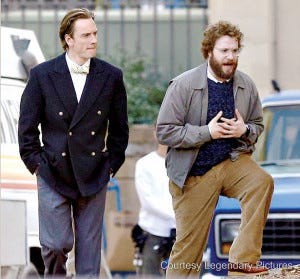The film “Steve Jobs” is the perfect storm of well-crafted directing, top-notch acting and a great script. Michael Fassbender takes on the role of the Apple co-founder and lands every subtle nuance of a brilliant man who is misunderstood but tyrannical in his quest to be understood. He is an artist, a father, a business man and most importantly (in his eyes) a visionary. The dialogue is so quick and witty — standard for an Aaron Sorkin script — that at some points it may be a challenge to keep up, but it is a challenge worth accepting. The structure of this film is done in a unique way: it takes place a half hour before three major product launches in Jobs’ career.
The first part, shot in low-res 16mm film, is set in 1984 in Cupertino at the launch of the Macintosh. The second part, shot in widescreen 35mm film, takes place at the San Francisco Opera House and shows Jobs, now fired from Apple, launching his NeXT cube. The final act, shot in high def digital, takes place in 1998 at San Francisco’s Davies Symphony Hall, where Jobs is now back at Apple and about to launch the revolutionary iMac.  Danny Boyle absolutely knocks it out of the park with his direction of the Sorkin script. Boyle brings his visionary touches to almost every genre of film, from his children’s movie “Millions,” his horror film “28 Days Later,” his drug-fueled mind trip “Trainspotting,” his sci-fi mind-bender “Sunshine” to his Academy Award-winning drama “Slumdog Millionaire.” He is one of the most talented directors of this generation and does an absolute brilliant job of directing the actors in this mental chess game of a movie. This drama, set at the pace of a well-made action movie and with Boyle’s visual flare, only draws you in that much deeper and highlights the insights we are given into this visionary’s mind.
Danny Boyle absolutely knocks it out of the park with his direction of the Sorkin script. Boyle brings his visionary touches to almost every genre of film, from his children’s movie “Millions,” his horror film “28 Days Later,” his drug-fueled mind trip “Trainspotting,” his sci-fi mind-bender “Sunshine” to his Academy Award-winning drama “Slumdog Millionaire.” He is one of the most talented directors of this generation and does an absolute brilliant job of directing the actors in this mental chess game of a movie. This drama, set at the pace of a well-made action movie and with Boyle’s visual flare, only draws you in that much deeper and highlights the insights we are given into this visionary’s mind.
The actors could not have been any better. Fassbender, who actually replaced Christian Bale after he dropped out of the role, plays Jobs with such a ferocity and coldness that it is hard to see him as likable. Then there are subtle flashes of humanity that show he is just a man trying to be understood. He needs total control. If everyone could just trust his vision, the world would be a better place but he is fought the whole way. Seth Rogen superbly plays Steve Wozniak, Jobs’ long time friend and co-founder of Apple. Wozniak’s and Jobs’ scenes together are absolutely touching and painful to see and really bring out the most heart in this film. Jeff Daniels is great as John Scully, the brilliant man who wanted to save Jobs from himself. He is blamed for firing Jobs from Apple and thus sets in motion the Jobs revenge machine. The only person that seems to be able to work with Jobs is Joanna Hoffman, who is played by Kate Winslet. Her award-caliber performance as Hoffman is the perfect balance of strength and heart needed to win the respect of Jobs and everyone who has to deal with Jobs on a daily basis.
“Steve Jobs” is a brilliant film that does not shy away from the uncomfortable moments of this man’s life. It is a film that brings real insight to the man who brought comfort and usability to the age of the computer. He saw the way the world should be and he saw it as a beautiful place and he just wanted everyone else to get there with him. There is not a single person today who is not touched by the legacy this man has left behind; the history books are already being marked up with his image and contributions. This film is a portrait of a man who changed the way the world functioned and is absolutely worth your time and money. It is relevant to everyone; his brilliance touched us all and this is the film he deserves.
Categories:
‘Steve Jobs’ is an unlikely delight
October 29, 2015
Tags:
About the Contributor
In the fall of 2019, The Laney Tower rebranded as The Citizen and launched a new website. These stories were ported over from the old Laney Tower website, but byline metadata was lost in the port. However, many of these stories credit the authors in the text of the story. Some articles may also suffer from formatting issues. Future archival efforts may fix these issues.

























